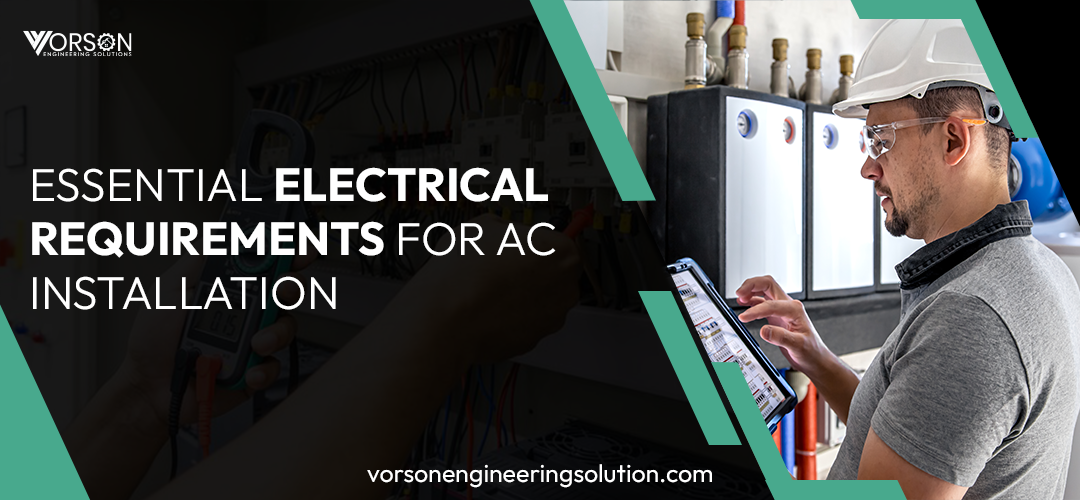Air conditioner (AC) runs safely and effectively depends on knowing the basic electrical needs during installation. Whether you’re replacing an old system or adding a new AC to your house, proper planning and following electrical guidelines are absolutely vital. This article will discuss the required electrical issues for AC installation, covering several air conditioning models and their particular energy consumption.
Understanding AC Installation
AC installation involves more than just placing a unit and turning it on. To be sure your house’s electrical system can meet the new unit’s power consumption, give it great thought. It not only guarantees effective functioning but also helps prevent possible safety risks via proper electrical setup.
Assessing Electrical Capacity
Find out the electrical capacity of your house before putting an AC unit in place. Because air conditioners require a lot of power, your electrical system must be able to handle this load.
Circuit Breaker:
Your panel of circuit breakers should feature a separate AC unit circuit. This guarantees a steady electricity supply and helps to avoid overloading. For your AC model, the manufacturer’s recommendations for the circuit breaker should guide the size.
Wiring:
The right gauge of wiring used for the AC installation will help to manage the electrical load. Bad wiring could cause overheating and potentially fires. An electrician will guarantee the wiring meets safety criteria.
Voltage Requirements
Different types of air conditioners operate at different voltages. Making sure your electrical system offers the right voltage for your particular AC unit is absolutely vital. Incorrect voltage might ruin the machine and result in expensive repairs.
Central air conditioners typically run at 208 volts.
Window air conditioners typically run at 110 volts.
Mini-split air conditioners typically operate at approximately 208 volts.
Electrical Connections
AC unit’s safety depends on proper electrical connections. To prevent any electrical risks, firmly link the ground and power cables.
Grounding:
Safety depends on correct grounding, which directs stray electrical currents away from the unit and helps to avoid electrical shocks. Make sure that the AC unit grounds itself in line with local norms and codes.
Connections:
A licensed electrician should make every electrical connection to ensure its security and correctness. Inappropriate or loose connections could cause unsafe circumstances and electrical problems.
Electrical Code Compliance
A safe and effective installation depends on following local electrical codes and regulations. These codes ensure that every electrical project meets safety standards and helps to avoid problems such as overheating and electrical fires.
Permits:
An AC installation permit may be required in your area. This ensures that the installation meets all safety requirements and undergoes inspection. Your electrician can assist with getting licenses and planning visits.
Standards:
Electrical codes define standards for various components, circuit breakers, and wiring. These guidelines guarantee that your AC unit runs effectively and safely.
Electrical Requirements for Various Air Conditioning Models
There are several kinds of air conditioners, each with a unique energy consumption. Correct installation depends on awareness of these criteria:
Central air conditioners, which typically require roughly 208 volts and require a separate circuit and significant power supply, are used to cool large indoor areas.
Window air conditioners, which operate at roughly 110 volts, typically consume less power than central air conditioners, making them ideal for cooling smaller areas.
Mini-split air conditioners can need roughly 208 volts, the same as central systems. They are a good choice for cooling specific rooms in a house without ducting.
How Much Energy Does a Home Need to Support an Air Conditioning System?
The energy requirements for an AC installation will be determined by the type of unit you choose and the electrical system in your house. Most houses with central air conditioners usually have an electrical system that can meet their power consumption. Meanwhile, some smaller homes or apartments may use window units or other less energy-intensive systems.
Your house should have at least a 200-amp electrical service for a conventional central air conditioner to run other appliances and lights in addition to supporting the AC unit. A qualified electrician can do an electrical assessment to help you decide whether the new unit will fit your house.
Electrical Evaluation:
An electrician will evaluate your house’s electrical system and do tests to ascertain whether it satisfies the new AC unit’s energy needs. If your system is insufficient, we can modify it to accommodate the additional load before installing the AC.
Ensuring that your air conditioner runs effectively and safely depends on your knowledge and ability to meet the electrical needs for AC installation. Correct installation is critical to avoiding potential problems and maximizing performance, from evaluating electrical capacity and voltage requirements to creating safe connections and following local codes.
If you want to make sure all electrical needs are met and intend to install a new air conditioner, contact Vorson Engineering. Our knowledgeable AC installation services include a comprehensive inspection of your electrical system to guarantee everything is compliant. Working with Vorson Engineering guarantees a flawless and professional installation that satisfies all your expectations. Get in touch right now to arrange your consultation and savor cool and comfortable surroundings free from worry.



